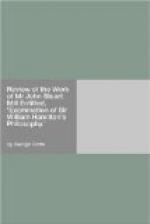He handles this grand theme—eleythheroys eleythheros philosophein—involving as it does the best interests of philosophy, as an instructress to men’s judgments, and a stimulus to their intelligence—with great depth of psychological analysis sustained by abundant historical illustration. And he in the same volume discusses most profitably another question akin to it—To what extent, and by what principles, the interference of others is justifiable, in restraining the liberty of taste and action for each individual? A question at once grave and neglected, but the discussion of which does not belong to our present article.
A new work from one who has already manifested such mastery of philosophy, both in principle and in detail, and a work exhibiting the analysis and appreciation of the philosophical views of an eminent contemporary, must raise the highest expectation. We think no reader will be disappointed who peruses Mr Mill’s ‘Examination,’ and we shall now endeavour to give some account of the manner in which he performs it. Upon topics so abstract and subtle as the contents of this volume, the antithesis between two rival theories is the best way, and often the only way, for bringing truth into clear view; and the ‘Examination’ here before us is professedly controversy. But of controversy in its objectionable sense—of captious or acrimonious personality—not a trace will here be found. A dignified, judicial equanimity of tone is preserved from first to last. Moreover, though the title and direct purpose of the volume is negative and critical, yet the destructive criticism is pervaded by many copious veins of constructive exposition, embodying Mr Mill’s own views upon some of the most intricate problems of metaphysics.




